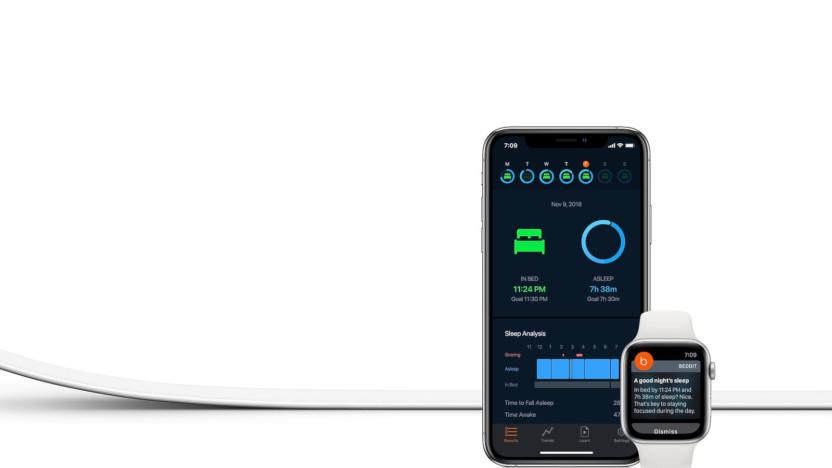sleeptracker
Latest

Apple releases its first Beddit sleep monitoring device
Apple hasn't ditched, killed or forgotten Beddit. The tech giant has finally released the first Beddit sleep monitoring device since it purchased the company in early 2017, and it's now available for purchase from its website. Just like the company's previous devices, the new one is a thin sensor strip you need to place under the sheets. It then automatically tracks the sleep time, heart rate, breathing and snoring for up to two people -- it also takes note of the bedroom's temperature and humidity, so you'll know your ideal conditions to get a good night's sleep.

Fitbit's new Charge and Flex track every type of workout
It's no surprise that Fitbit's been planning a major update to its fitness trackers. And about time, too. The two-year-old Charge and three-year-old Flex are in dire need of a tune-up to help the company maintain (or grow) its narrow lead in the industry, after it lost a significant amount of market share to newer rivals. As a result, the new Charge 2 and Flex 2 boast a decent set of aesthetic and functional upgrades that could help take on the competition, including specific workout tracking (finally) and guided breathing exercises.

Samsung's SleepSense tracker shuts off the TV when you snooze
Samsung has just revealed its take on the sleep-tracking concept with a new device called SleepSense. Rather than making you wear something on your wrist at night (which is a non-starter for a lot of folks), Samsung proposes that you slip the flat, disk-like device under your mattress, like similar devices from Withings and Misfit. It will then monitor your heart rate, breathing and movement during sleep with a claimed 97 percent accuracy. That information is transmitted to a smartphone app, which gives you an "individual sleep score" based on seven factors, including total sleep time, the number of times you awoke and the percentage of REM sleep.

Nintendo is making a fatigue and sleep-tracking health device
At a briefing earlier today, Nintendo CEO Satoru Iwata explained that the company was now developing a device to monitor sleep and levels of fatigue. However, it didn't sound like it would be a wearable device -- even though it's the done thing. According to a Reuters report, the device would track you from your bedside and is currently being co-developed with Resmed. The US-based company typically makes products for people with sleep disorders. It will form part of its new healthcare division inside the gamesmaker, marking a return to wellness hardware: something it has already touched on, way back, with the Wii Fit board. For an idea of what it all could do, we've added a video from Resmed's sleeping tech. Exactly how this will dovetail with our Tomodachi Life village remains to be seen.

Wearable device stats prove it: you're not getting enough sleep
If you've ever groused that you don't get enough sleep, you now know that you're not alone -- far from it, in fact. The Wall Street Journal has provided a rare glimpse at the tracking data from hundreds of thousands of Jawbone Up wearers worldwide, revealing both their collective sleeping habits as well as their activity when they're awake. And... it's not looking good. Even in well-rested cities like Melbourne, the average person slept just over the minimum recommended 7 hours. In Tokyo, many people get less than 6 hours. You don't want to look to your friends for help, then, since they're probably just as groggy as you.

Keepin' it real fake: China's Codoon SmartBand pays homage to Jawbone Up
Viewing it from afar, you could easily mistake this gadget for Jawbone's Up fitness band. What we have here is actually the SmartBand from Chinese fitness accessories maker Codoon, and it's almost a carbon copy of the Up in terms appearance and functionality. Bend this strip around your wrist to track your movement and sleeping patterns (with the ability to wake you up with vibration at the optimal sleeping cycle; just like the Up), and afterwards, plug the hidden 3.5mm headphone jack into either an iPhone or an Android device for analysis and sharing through Codoon's website. After we reached out to Baidu regarding the Baidu Cloud logo on the SmartBand, a spokesperson told us that it's the first wearable developed on top of Baidu's PCS (Personal Cloud Service) to sync and share data, and Codoon's upcoming Bluetooth fitness products will work on the same platform (likewise for the Baidu Eye project). Still, it's a real shame that the startup couldn't come up with its very own design for its first hero product. Expect this rip-off to hit the market in early June for an unknown price -- but you can already get an Up in China, anyway.





